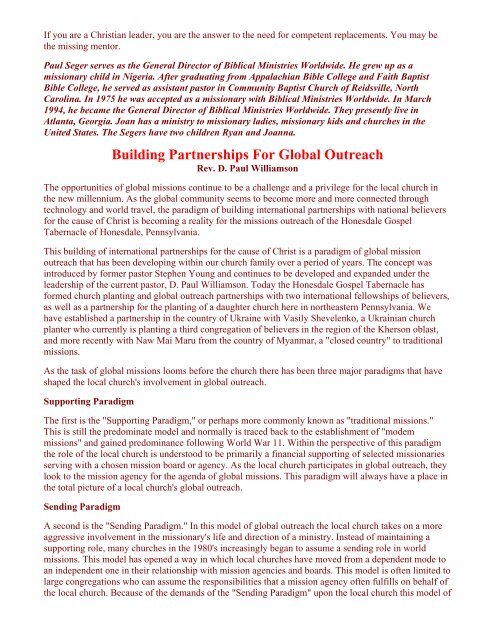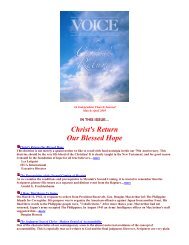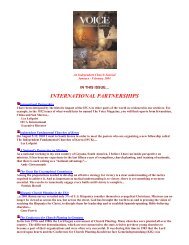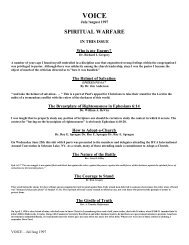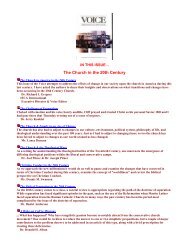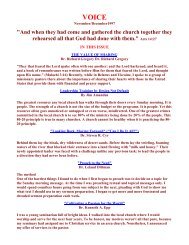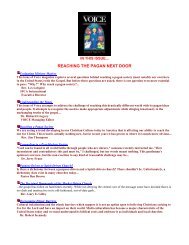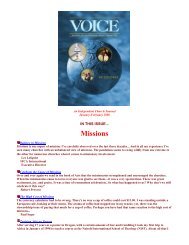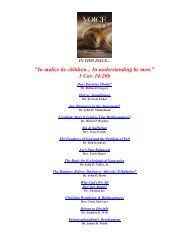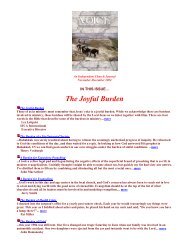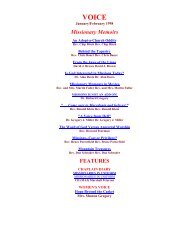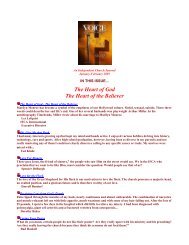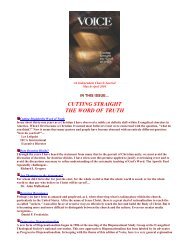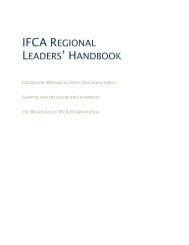URGENCY OF THE HOUR - IFCA International
URGENCY OF THE HOUR - IFCA International
URGENCY OF THE HOUR - IFCA International
Create successful ePaper yourself
Turn your PDF publications into a flip-book with our unique Google optimized e-Paper software.
If you are a Christian leader, you are the answer to the need for competent replacements. You may be<br />
the missing mentor.<br />
Paul Seger serves as the General Director of Biblical Ministries Worldwide. He grew up as a<br />
missionary child in Nigeria. After graduating from Appalachian Bible College and Faith Baptist<br />
Bible College, he served as assistant pastor in Community Baptist Church of Reidsville, North<br />
Carolina. In 1975 he was accepted as a missionary with Biblical Ministries Worldwide. In March<br />
1994, he became the General Director of Biblical Ministries Worldwide. They presently live in<br />
Atlanta, Georgia. Joan has a ministry to missionary ladies, missionary kids and churches in the<br />
United States. The Segers have two children Ryan and Joanna.<br />
Building Partnerships For Global Outreach<br />
Rev. D. Paul Williamson<br />
The opportunities of global missions continue to be a challenge and a privilege for the local church in<br />
the new millennium. As the global community seems to become more and more connected through<br />
technology and world travel, the paradigm of building international partnerships with national believers<br />
for the cause of Christ is becoming a reality for the missions outreach of the Honesdale Gospel<br />
Tabernacle of Honesdale, Pennsylvania.<br />
This building of international partnerships for the cause of Christ is a paradigm of global mission<br />
outreach that has been developing within our church family over a period of years. The concept was<br />
introduced by former pastor Stephen Young and continues to be developed and expanded under the<br />
leadership of the current pastor, D. Paul Williamson. Today the Honesdale Gospel Tabernacle has<br />
formed church planting and global outreach partnerships with two international fellowships of believers,<br />
as well as a partnership for the planting of a daughter church here in northeastern Pennsylvania. We<br />
have established a partnership in the country of Ukraine with Vasily Shevelenko, a Ukrainian church<br />
planter who currently is planting a third congregation of believers in the region of the Kherson oblast,<br />
and more recently with Naw Mai Maru from the country of Myanmar, a "closed country" to traditional<br />
missions.<br />
As the task of global missions looms before the church there has been three major paradigms that have<br />
shaped the local church's involvement in global outreach.<br />
Supporting Paradigm<br />
The first is the "Supporting Paradigm," or perhaps more commonly known as "traditional missions."<br />
This is still the predominate model and normally is traced back to the establishment of "modem<br />
missions" and gained predominance following World War 11. Within the perspective of this paradigm<br />
the role of the local church is understood to be primarily a financial supporting of selected missionaries<br />
serving with a chosen mission board or agency. As the local church participates in global outreach, they<br />
look to the mission agency for the agenda of global missions. This paradigm will always have a place in<br />
the total picture of a local church's global outreach.<br />
Sending Paradigm<br />
A second is the "Sending Paradigm." In this model of global outreach the local church takes on a more<br />
aggressive involvement in the missionary's life and direction of a ministry. Instead of maintaining a<br />
supporting role, many churches in the 1980's increasingly began to assume a sending role in world<br />
missions. This model has opened a way in which local churches have moved from a dependent mode to<br />
an independent one in their relationship with mission agencies and boards. This model is often limited to<br />
large congregations who can assume the responsibilities that a mission agency often fulfills on behalf of<br />
the local church. Because of the demands of the "Sending Paradigm" upon the local church this model of


